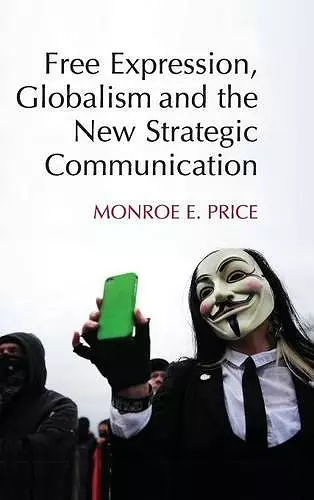Free Expression, Globalism, and the New Strategic Communication
Format:Hardback
Publisher:Cambridge University Press
Published:15th Dec '14
Currently unavailable, and unfortunately no date known when it will be back
This hardback is available in another edition too:
- Paperback£28.99(9781107420939)

This book exposes the anxieties of loss of control and missed opportunities for freedom of expression resulting from changes in technologies and geopolitics.
Building on examples drawn from the Arab Spring, the shaping of the internet in China, Iran's perception of foreign broadcasting, and Russia's media interventions, this book exposes the anxieties of loss of control and the missed opportunities for greater freedom of expression that result from the vast changes in technologies and geopolitics.Vast changes in technologies and geopolitics have produced a wholesale shift in the way states and other powerful entities think about the production and retention of popular loyalties. Strategic communication has embraced these changes as stakes increase and the techniques of information management become more pervasive. These shifts in strategic communications impact free speech as major players, in a global context, rhetorically embrace a world of transparency, all the while increasing surveillance and modes of control, turning altered media technologies and traditional media doctrines to their advantage. This book exposes the anxieties of loss of control, on the one hand, and the missed opportunities for greater freedom, on the other. 'New' strategic communication arises from the vast torrents of information that cross borders and uproot old forms of regulation. Not only states but also corporations, nongovernmental organizations, religious institutions, and others have become part of this new constellation of speakers and audiences.
'… Monroe Price challenges and transforms the way we observe, study and think about power and communications in society. A vivid, erudite and ambitious update of the theory of free expression - highly needed at a time of radical change in technology and geo-politics. Eloquent and masterly written, packed with surprising connections and refreshing metaphors. Price's 'architecture of information flows' construction thesis elaborated throughout the book is utterly enlightening - complimenting his prominent 'market for loyalties' argument. A book without any peer.' Stefaan G. Verhulst, Co-Founder and Chief of Research and Development, The GovLab, New York University
'Incisive in its analysis, comprehensive in its geographic sweep and up-to-the-minute in its scope, Monroe Price has written a splendid book on the challenges facing free expression in our globalized world. This is essential reading for all scholars of international communication and confirms Price's position as the leading thinker in his field.' Nicholas J. Cull, University of Southern California, Annenberg School for Communication and Journalism
'Price frames this book as an invitation to a dialogue over the future architecture of information systems - it is a conversation worth having. Impressively broad in scope, interdisciplinary, conceptually subtle and empirically detailed, Price traces how media law, international norms, strategic communications, transnational actors and statist geopolitics interact to shape the politics of free expression within a global society increasingly anxious about these processes. This is an important point of engagement for those interested in these issues, students and scholars alike.' Daniel McCarthy, University of Melbourne
'Admirably inclusive in its scope, this empirically-rich and theoretically sophisticated book makes a significant and strategic intervention in the study of international communication in our globalized digital age.' Daya Thussu, University of Westminster, London
'… a path-breaking book that charts new territory for the enormously important issue of speech in the digital age. Price skillfully weaves together diverse examples from Iran to Somaliland and explores the motivations of a wide variety of actors beyond governments, including NGOs and religious leaders. While recognizing the diverse approaches towards the relationship between speech and society, and the different cultural and political values that underlie this relationship, the book offers compelling arguments that clearly illustrate the substantial challenges societies face to uphold values such as free expression in the digital age. It is a bold and very readable account for all those interested in understanding how actors attempt to shape information environments from the global to local level.' Nicole Stremlau, Centre for Socio-Legal Studies, University of Oxford
ISBN: 9781107072510
Dimensions: 229mm x 152mm x 21mm
Weight: 590g
286 pages